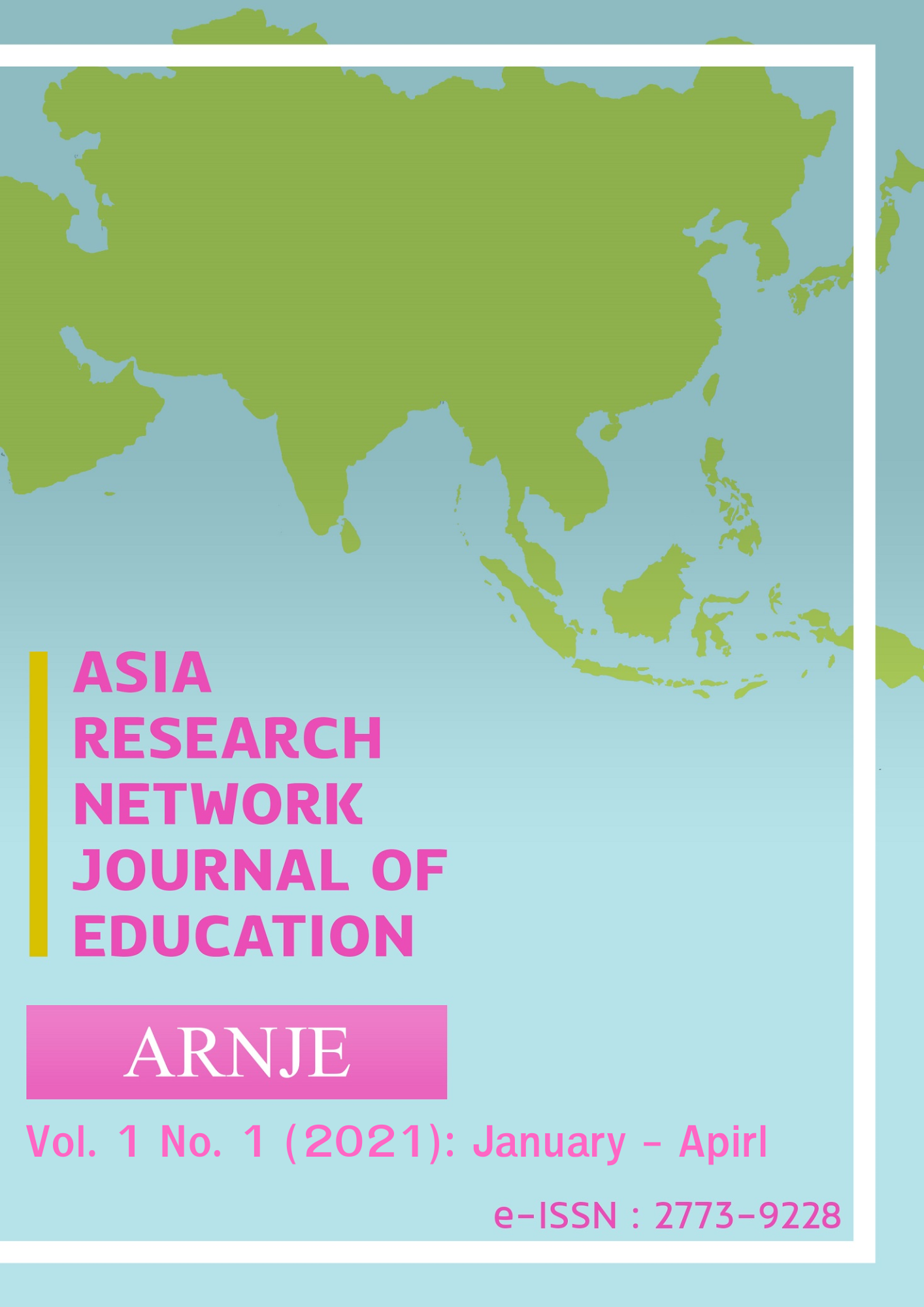Examine First Grade Students’ Strategies of Solving Open-ended Problems on Addition
Main Article Content
Abstract
The study aimed to examine the first Grade students’ strategies of solving open-ended problems on addition. Methodology regarded interpretive paradigm. Participants included 76 grade 1 students of the academic year 2019 in Khon Kaen University Demonstration Primary School, Khon Kaen, Thailand. The addition learning activities were organized through open approach which immersed in lesson study Professional Learning Community. The intervention of addition was provided to enhance students to learn various ways of solving open ended problems about addition. Data about students’ strategies of solving open ended problems was collected through participant observation, interview, lesson study reflection, and students’ tasks. Students’ strategies of solving open ended problems, then, was interpreted and categorized into groups. The findings revealed (1) students’ strategies of solving open ended problems on addition, and (2) suggested about student fundamental strategies of solving problem on addition. Students’ strategies of solving open ended problems on addition could be categorized into 6 strategies. These included 1) total counting, 2) counting, 3) making ten full, 4) separation option, 5) separation plus addition and 6) separation plus addition and separation. The reflection of lesson study suggested some fundamental strategies of solving problem on addition. These included 1) practicing about making ten full by using blocks and rail blocks, 2) practicing about using blocks and symbols, and 3) teachers’ providing of encourage questions to find other ways of addition.
Article Details
Copyright: CC BY-NC-ND 4.0
References
Clarke, D.J. & Sullivan, P.A. (1992). Responses to open-ended tasks in mathematics: characteristics and implications. In: Proceedings of the PME 16 (ed. W. Geeslin& K. Graham). Volume I, 137-144.Durham (NH): University of NewHampshire.
Gravemeijer, K., & Doorman, M. (1999). Context problem in realistic mathematics education: A calculus course as an example. Educational Studies in Mathematics, 39, 111-129.
Inprasitha, M. (2010). One feature of adaptive lesson study in Thailand: Designing learning unit. In Proceeding of the 45th Korean National Meeting of Mathematics Education Dongkook University (pp. 193-204). Gyeongju: Dongkook University.
Kadroon, T., & Inprasiha, M. (2011). Teachers’ values about teaching athematics in classrooms; Implementing lesson study and open approach: A Thai experience. Journals of the Korean Society of Mathematics Education Series D, 15, pp. 115-126.
Kadroon, T., & Inprasiha, M. (2013). Professional Development of Mathematics Teachers with Lesson Study and Open Approach: The Process for Changing Teachers Values about Teaching Mathematics. Psychology, 4(2): 101-105.
Lewis, C. C., & Hurd, J. (2011). Lesson study step by step. Portsmouth, NH: Heinemann.
Mason, J. (1991). Mathematical problem solving: open, closed and exploratory in the UK. International Reviews on Mathematical Education (= ZDM) 23 (1), 14-19.
Matoba, M. (2005). Improving Teaching and Enhancing Learning: A Japanese Perspective. The First Annual Conference on Learning Study, The Hong KongInstitute of Education, 1-3 December 2005
Nguyen T T 2018. Some suggestions on the application of the realistic mathematics education and the didactical situations in mathematics teaching in Vietnam. HNUE Journal of Science - Educational Sciences, 63 (9), 24-33
Nohda, N. (1991). Paradigm of the "Open-approach" method in mathematics teaching: Focus on mathematical problem solving. International Reviews on Mathematical Education (= ZDM,) 23 (2), 32-37.
Nohda, N. (1995). Teaching and Evaluating Using "Open-Ended Problem" in Classroom. International Reviews on Mathematical Education (= ZDM), 27 (2), 57-62.
Nohda, N. (2000). Teaching by open-approach method in Japanese mathematics classroom. Proceeding of the 24th conference of the international Group for the Psychology of Mathematics Education, Hiroshima, Japan, July 23-27, volume 1-39-53.
Pehkonen, E. (1995). Using open-ended problem in mathematics. Zentralblatt fur Didaktik der Mathematik, 27(2), 67-71.
Pehkonen, E. (1997). Use of Open-Ended Problems in Mathematics Classroom.Research Report. Helsinki, Finland.
Stigler, J. W., & Hiebert, J. (1999). The teaching gap: Best ideas from the world’s teachers for improving in the classroom. New York: The Free Press.
Taylor, P. C., Fraser, B. J., and Fisher, D. L. (1997). Monitoring constructivist classroom learning environments. International Journal of Educational Research, 27, 293-302.
Thao-Do, T.P., Bac-Ly, D.T., and Yuenyong, C. (2016) Learning Environment in Vietnamese Physics Teacher Education Programme through the Lens of Constructivism: A Case Study of a State University in Mekong Delta Region, Vietnam. International Journal of Science and Mathematics Education, 14(Suppl 1): S55 - S79
Treffers, A. (1991). Realistic mathematics education in The Netherlands 1980-1990. In: Realistic mathematics education in primary school (ed. L. Streefland), 11-20.Utrecht: Freudenthal Institute.
Tupsai, J., Yuenyong, C., and Taylor, P.C. (2015). Initial implementation of constructivist physics teaching in Thailand: A case of bass pre-service teacher. Mediterranean Journal of Social Sciences, 6(2), 506-513.
Udomkan, W., Suwannoi, P., Chanpeng, P., Yuenyong, C. (2015). Thai Pre-service Chemistry Teachers’ Constructivist Teaching Performances. Mediterranean Journal of Social Sciences, 6(4 S3), 223-232.
Wiliam, D. (1994). Assessing authentic tasks: alternatives to mark-schemes. Nordic Studies in Mathematics Education, 2 (1), 48-68.
Woranetsudathip, N. and Yuenyong, C. (2015). Enhancing grade 1 Thai students’ learning about mathematical ideas on addition through lesson study and open approach. Mediterranean Journal of Social Sciences, 6(2S1), 28-33.
Woranetsudathip, N, Yuenyong, C, and Nguyen, TT (2021). The innovative lesson study for enhancing students’ mathematical ideas about addition and subtraction through open approach. Journal of Physics: Conference Series, 1835 (1), 012061
Yuenyong, C. and Thathong, K. (2015). Physics teachers’ constructing knowledge base for physics teaching regarding constructivism in Thai contexts. Mediterranean Journal of Social Sciences, 6(2), 546-553.
Zimmermann, B. (1991). Offene Probleme fur den Mathematikunterricht and ein Ausblick auf Forschungsfragen.In: International Reviews on Mathematical Education (= ZDM) 23 (2), 38-46.


